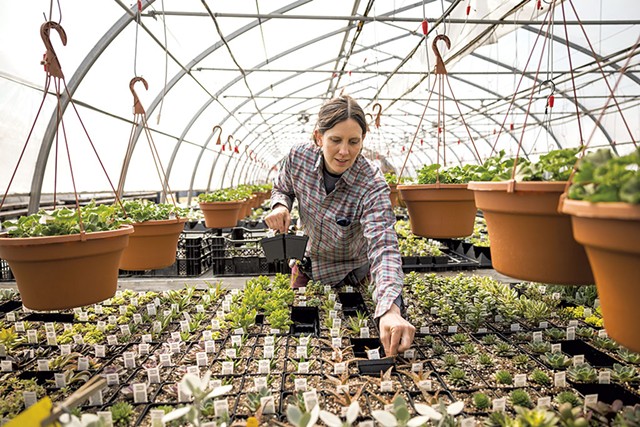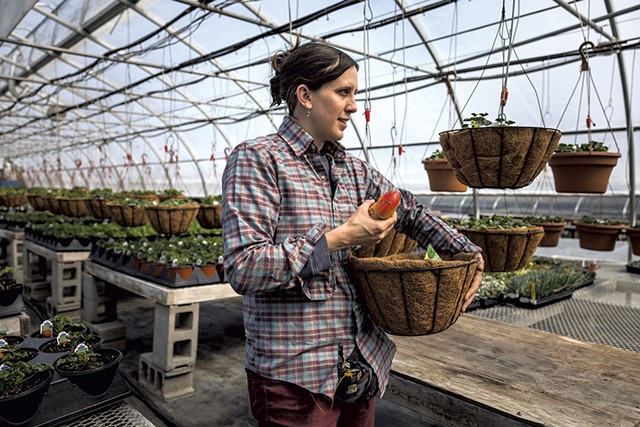
- Rob Strong
- Valerie Woodhouse
Things weren't going well for Valerie Woodhouse in spring 2021. Woodhouse, then 30, was in her second year as a full-time organic vegetable farmer in Norwich. There was a drought. She was managing a farm team for the first time. To make matters worse, her partner, Eli Hersh — who co-owns the 35-acre farm — had found out his mother was dying.
"That was probably the lowest my mental health has ever been," Woodhouse said. "I was very raw and tired and overwhelmed." Woodhouse and Hersh tried their best to balance visiting Hersh's mother and tending to their fledgling farm, but at times it felt impossible.
"The farm has to keep going regardless of what happens," she said.
Prior to farming, Woodhouse had worked as a manager at Howard Center, the Burlington-based nonprofit that offers counseling to children and adults. She wondered why — despite her years of training and work as a mental health professional — she couldn't seem to deal with the stress of running a farm.
"I had a therapist who was like, 'Valerie, you should know this,'" Woodhouse recalled. "'You've been trained in this work. You need to set boundaries.' And then it just made me feel worse."
Woodhouse's experience is not unique. Many farmers face mental health challenges that defy the popular perception of a tranquil, bucolic life. Unpredictable weather patterns, low profit margins, geographic isolation, and a permeable boundary between life and work can produce mental stresses unique to farming life. Vermonters who work in agriculture are three times more likely to die by suicide than the general population, according to data collected by the state Department of Health. The phenomenon is systemic and complex, experts say, with the stigma surrounding mental health an additional barrier.
But a new peer support network developed by Farm First, a Vermont-based nonprofit, aims to provide farmers with free mental health support by connecting them with trained listeners who understand their experiences best: fellow farmers.
Farm First's peer network, though modest in scale, is one of the first of its kind in the country. Backed by a $500,000 grant from the U.S. Department of Agriculture, Farm First has trained an initial cohort of 16 farmers, ranging in age and expertise, in active listening and anxiety management, among a slew of other skills. Those who participate in the training are paid a stipend of $1,000 but are otherwise considered volunteers. Peer farmers are asked to stay on for a year, but if they need to take a break or stop at any time, they can. Farmers are expected to provide support on varied fronts, including financial concerns, crop issues, alcoholism and illness.
"The difference with peer counselors is, there's common ground right there," said Alicia Jenks of Green Dragon Farm in Weathersfield, one of the 16 peer mentors who started in February.
Karen Crowley, program manager at Farm First, said the idea for the project sprouted after the nonprofit — which offers a broad range of help to farmers — noticed an increase in calls from people saying they needed mental health support.
Although workplace stress is a reality across many professions, farmers face conditions largely out of their control that will ultimately determine financial success or failure. And with volatile, often extreme weather becoming more common, the related stress on farmers is also on the rise. One bad storm, or one dead animal, can mean the difference between a bill being paid or not.
"It's almost like they have a choice sometimes to feed their cows or to feed their family," said Matt Strassberg, director of the Environmental Mediation Center, a Vermont-based nonprofit that helps farmers resolve disputes. "It's really hard for non-farmers to fathom how one would work for 40 hours a week — [or] even 70 or 80 hours a week — and potentially not make money."
And there's no going home to leave work behind at the end of the day. "You look out the window and see a to-do list," said Woodhouse, who signed up as a peer mentor as soon as she heard about Farm First's initiative. That blurred line between work and home puts added pressure on family relationships. Add succession planning to the mix — and the possibility that a child may not want to inherit their parent's failing dairy farm — and the border between home and farm becomes nearly invisible.
"Farming destroys marriages," said Paige Wener, owner of Green & Gold CSA in Sudbury, mustering a laugh.

- Rob Strong
- Valerie Woodhouse
Aggravating matters are the physical isolation of most farms and the hesitation of many farmers to ask for help. Farmers tend to embrace self-reliance and a gritty, do-it-yourself ethos, but these same attributes often discourage them from seeking mental health resources. Josie Rudolphi, an assistant professor at the University of Illinois Urbana-Champaign who studies farmers' mental health, said she often hears from farmers who say they are hesitant to park their truck in front of a mental health clinic because they don't want an acquaintance to see it there.
And that's if a farmer can afford therapy. Lack of affordable health care is another roadblock to help, specialists say.
Many Vermonters have an idealized vision of farming. Woodhouse said she's been advised not to "guilt" her customers into buying products but acknowledges that her upbeat "farmstagram" shows half of the story. "You're not seeing pictures of the falling-apart pieces of the farm," she said.
The compounding effect of these factors is considerable. Among young adult farmers surveyed in a 2020 study conducted by Rudolphi, 60 to 70 percent meet the criteria for at least mild anxiety and depression. That's compared to 20 to 30 percent of the general population.
Wener, the Sudbury farmer, has experienced those pressures. In 2020, she was dealing with a drought on a new farm, hand-watering plants by the acre. She was worried that she wouldn't be able to provide the food she had sold to her subscription-based customers at the beginning of the season.
"It was the lowest I've ever been," Wener recalled. "I had to reassess my relationship with addictive substances. I got a therapist. I started massage therapy."
The experience also inspired her to become a peer mentor through Farm First.
Even the training seemed to spark relief among the farmer mentors. An initial exercise, in which peer mentors introduced themselves and named their biggest challenges and resources, took over three hours. To some, it felt like a release. "I just felt so empowered, supported and fulfilled," Woodhouse said.
The peer support network went live at the beginning of February and is accessible through an interactive map on the Farm First website that provides background information on the farmer mentors. Those seeking help can reach out to the peer of their choice using a form on the website.
There have been just a handful of contacts so far, but Crowley said things will likely ramp up once the growing season kicks into gear.
The farmer peer network does not, however, address the needs of Vermont's roughly 1,000 migrant farmworkers, who face very different challenges. Dan Baker, an assistant professor at the University of Vermont who works with migrant dairy farmworkers, said housing and the migrant experience are common sources of mental stress among farmworkers. Often migrants, many from Mexico, miss their families and fear deportation, though there are few mental health resources for them. Increasing those resources, Baker argued, should be a priority for the state.
Farm First is among a patchwork of programs across Vermont aimed at supporting farmers through technical assistance, financial mediation services and mental health support. Some consider Vermont to be one of the most supportive states in the country for farmers. Even so, many of the issues farmers face — such as a shrinking dairy industry, mounting debt and climate change — require broader, system-level change. Farmer advocates acknowledge that initiatives such as the peer support network can provide tools for farmers but can't fix those wider problems.
"There's an amazing resilience, I think, in people who get up and go to the barn every morning," said Jenks, the peer support farmer from Weathersfield.
For Woodhouse, that resilience comes from creating a support network for when things get hard and setting time aside to do breathing exercises with her crew before starting work. Things are looking up, she said. The unknowns of the next growing season await.










Comments
Comments are closed.
From 2014-2020, Seven Days allowed readers to comment on all stories posted on our website. While we've appreciated the suggestions and insights, right now Seven Days is prioritizing our core mission — producing high-quality, responsible local journalism — over moderating online debates between readers.
To criticize, correct or praise our reporting, please send us a letter to the editor or send us a tip. We’ll check it out and report the results.
Online comments may return when we have better tech tools for managing them. Thanks for reading.